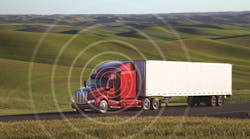There is no doubt that technology can be both a big help and a major hindrance to trucking operators these days – and you need look no farther than the impact of the electronic logging device (ELD) mandate for an example.
On the one hand, some truckers and industry experts believe the information ELDs can provide will help them foster more transparent and profitable relationships with shippers. Yet on the other, many small fleets executives and owner-operators think all ELDs will do is increase their costs and complicate their lives.
[A similar split exists among truck drivers, with like and dislike of ELDs in equal measure across the map.]
One recent study by consulting firm Ernst & Young Global Limited (EY) determined that global organizations need to embrace the concept of “duality” in which they sustain their core business while also creating disruptive new business models.
“Innovation is a challenge that often becomes more difficult with success, as growing and larger companies find themselves faced with more short-term concerns,” noted Mark Weinberger, EY’s global chairman and CEO, in that report.”
“Boardroom and CEO strategies will determine the success of business, but historical quarterly earnings and financial reports still move stock prices,” he stressed. “In today's accelerated digital economy, CEOs must strike the right balance by delivering on current business plans while strategically disrupting existing offerings in order to ignite the next phase of growth. Technology may be the cause of many challenges today — but if we approach it right, it's also the solution.”
"Our world is in transition from a model of business we are familiar with to one that is in many instances still undefined,” added Uschi Schreiber, EY’s global vice chair for markets and chair of the firm’s global accounts committee.
“The pace of change is unprecedented. Too many CEOs and boards are still focused on only one thing: short term efficiency and productivity improvements. But what's needed is also a focus on the medium term and on building the future,” he said. “This requires not just the use of up-to-date technology; it also means investing in innovation and being prepared to take some risks. Thinking and operating in duality can help corporations to seize the upside of disruption by focusing on their current success and growth as well as building the foundations for growth in the future.”
Trucking is more than a little familiar with the need to focus on the future, especially where connected technology is concerned.
On top of that, the impending passage of major tax reform legislation should also provide more capital to truckers for investing in “disruptive” technologies, too – well, at least in more trucks over the near-term, which come packed with all sorts of innovative technologies now.
For example, Michael Baudendistel, vice president of the transportation & logistics research group at Stifel Capital Markets, said in a recent research brief that that the tax bill will likely have an impact on the cash that truckload fleets have available to spend, with their capital spending decisions also possibly impacted by bonus depreciation.
“We believe the North American truck equipment market is poised for a period of strength over the next two-three years, and we do not believe 2018 will be the ‘peak’ year for production,” he added.
“We are forecasting Class 8 production of 305,000 units in 2018 and 315,000 units in 2019,” Baudendistel said. “We believe there is upside potential to both of those numbers – with less downside risk in 2018, especially.”
From a broader perspective, businesses seem to be more gaining more confidence in their ability to master the benefits of “disruptive technologies” as well.
Mark Whitmore, private global leader for Deloitte Canada – a division of worldwide consulting firm Deloitte LLC – noted in a recent report that private companies are embracing “digital disruption” for competitive gains.
Two-thirds of respondents to Deloitte’s poll for that report associate technology advances with new opportunities and positive outcomes, with “emerging technologies” integral to the playbooks of private companies.
Among the primary objectives for deployment, 62% of companies aim to increase efficiency, with 46% using technology to improve customer engagement, 45% striving to facilitate growth, and 37% are using emerging technologies for research and development.
Others cite data analytics/business intelligence and automation of business processes to realize growth ambitions, Deloitte said
Still, while many view “disruption” through an “optimistic lens,” the firm’s poll also found there are some negative impacts that come with this trend as well.
Those include: Changes in customer expectations (31%), macroeconomic market changes (38%), and shifts in regulations (39%). And almost half of respondents to Deloitte’s survey also believe disruption from “non-traditional” competitors is likely in the next few years – something truckers are also facing.
And that is but one trend that’s only likely to strengthen as we head into 2018.



